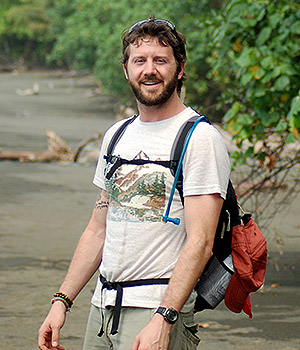Patrick Duggan JD/MA '10
 Trial Attorney
Trial Attorney
U.S. Department of Justice, Environment and Natural Resources Division, Environmental Crimes Section
Washington, D.C.
As a federal criminal environmental prosecutor, Patrick Duggan has a wide focus: domestic and international trade in protected species, serious violations of the Clean Water Act and the Clean Air Act, and international trade in illegal timber resources.
“The common denominator is that I work on cases where individuals or corporations knowingly choose profits or personal gain over environmental protection, whether that is our domestic resources or those of another country which eventually make their way into the U.S.,” says Duggan, who entered the DOJ’s Environmental Crimes Section through the highly selective Honors Program.
In 2013, he received an award from the Atlantic States Marine Fisheries Commission for his contributions to the success of fisheries management along the Atlantic coast through law enforcement, and has received multiple Special Achievement Awards from the Department of Justice for his trial work.
At Duke, Duggan received a JD and an MA in environmental science and policy, building on his background as an environmental engineer. He served as editor-in-chief of the Duke Environmental Law and Policy Forum (DELPF), president of the Environmental Law Society, and was a self-described “clinic rat” in the Environmental Law and Policy Clinic. On graduation he received the faculty awards for outstanding achievements in environmental law and in clinical practice.
Duggan credits three particular elements of his Duke experience with preparing him for his current practice: his clinic work; the relationships he formed with faculty who served first as teachers and mentors and then offered references; and the instruction and guidance he received in legal writing. His reflections offer a guideline for getting started:
- The clinical work: I can’t overstate the importance of true experience when interviewing for a prospective position. Now, as an interviewer, I can tell the difference between applicants who don’t have practical experience and those who do. There is a difference in their approach to a problem, which often reflects an understanding that a good argument is not enough — there are hundreds of small details, from document management to jury appeal to witness credibility, which are as important to a case as the legal merits. That understanding, which cannot be found in textbooks, can be gained through clinical work. I gained that insight by working in the Environmental Law and Policy Clinic, which in turn allowed me to speak with my interviewers as peers and assure them I would be able to handle the rigors of litigation.
- The relationships with faculty: Sitting in a professors’ office, at their home, or at a Durham haunt and discussing the “real world” was invaluable. I gained a ton of perspective on which NGOs did what, which areas of environmental law were growing, which were shrinking, and what an employer may actually care about outside of grades. I learned what employers value the most and how those values fit with my personality.
- For example, at various times I had conversations with faculty members about my organizational skills (which I was politely told “needed work”). Organization is not taught in law school, but can make or break a trial lawyer. So I worked on ways to improve those skills with guidance from the faculty, and learned how to discuss my weakness as well as my efforts to continually improve in that area. Those types of insights really only come through solid relationships with experienced folks, and I was lucky enough to have a number people willing to give me their time, mentorship, and friendship.
- Legal Writing: In the world of government litigation, judges want precise, pointed filings — an imprecise filing can sink an argument. [Senior Lecturing Fellow] Jeremy Mullem was my first-year legal writing professor, and my unofficial three-year legal writing consultant. He was always available for a discussion of whatever paper, publication, brief, or email I was working on. From the start he was genuinely interested in my growth as a writer, and he always tailored his assistance to me individually, even suggesting that I think of my writing as an equation where one assertion builds on another, given that I come from a world of numbers, not words. He said, ‘You have to put together the logical steps in a way such that each assertion builds on the previous to eventually prove the answer to the equation. In an equation, there are no extraneous proofs or side-formulas, so those are not needed in legal writing.’ I still think of that every time I am putting together a motion. Later, I took a course with [Senior Lecturing Fellow] Joan Magat (aka: “Coach”), who pushed my writing to a far more professional level, and who still serves as a resource I can rely on in my current practice. That attention to proper and correct writing has helped tremendously in my current practice, in which I often write motions on topics that a judge has never encountered before.